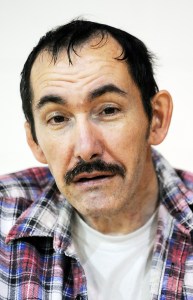To Bob McPhee, courage means going above and beyond the norm or doing something extra in the face of adversity.
Despite spending most of his life confined to a wheelchair and unable to speak, McPhee doesn’t think the term applies to him.
Many people who know McPhee would disagree, including the National Wrestling Hall of Fame, which is presenting him with its Medal of Courage.
The Hall of Fame awards the Medal of Courage to a wrestler who has overcome insurmountable challenges. The humble McPhee, who will travel to Stillwater, Okla., next June to receive the award and to be inducted when the group honors its Class of 2011, said he was surprised when he learned of the honor last month.
“Personally, I really do not feel that I’ve achieved any of it,” McPhee said. “I have just tried to live life the best possible way.”
That is an understatement, said Ted Reese, a long-time college and high school wrestling coach who is McPhee’s friend and mentor and who nominated him for the medal.
“I’ve been involved with the national team and so forth for years,” Reese said. “I’ve admired a lot of people who’ve been in my life. Certainly, there are some wrestling coaches who have changed my life. But there is no one that I admire more than Bob McPhee.”
In the summer of 1976, Reese was a coach on a Maine team that included McPhee. The team competed against an Austrian team in an international meet held in Maine.
“I remember (McPhee) very well as a scrappy, good athlete who was in good shape,” Reese said.
The highlight of the competition came when McPhee pinned the European champion and was named the meet’s outstanding wrestler. Three weeks later, McPhee suffered an injury to his brain stem during a football scrimmage as a Rumford High School senior.
McPhee emerged from a 17-day coma unable to walk or talk and with limited mobility in his upper body. He underwent three years of intense rehabilitation, then went on to attend the University of Maine, where he earned his journalism degree.
He joined the Sun Journal staff in 1987 and has been a constant presence in the western and central Maine sports scene ever since, particularly in field hockey, tennis and wrestling circles.
McPhee, who uses a device know as the “Liberator” to communicate and conduct interviews, chronicled his life and career in a book, “It Could Be Worse: The Rest of the Story.” Published by USA Wrestling of Colorado Springs, it was re-released late last summer.
The Dixfield resident’s love of wrestling is evident in the book, along with his coverage of the sport for the Sun Journal, as a correspondent for the Rumford Falls Times and online for the Maine Wrestling Alliance.
“There’s no question about it: He’s the best wrestling reporter in the state,” said Reese, who started the University of Southern Maine’s wrestling program. “But he doesn’t stop there. He keeps learning.”
A 2000 inductee into the Maine Amateur Wrestling Hall of Fame, McPhee continues to learn as much from wrestling as about it.
“Wrestling has prepared me to expect the unexpected,” he said. “Just because previous actions have produced positive results doesn’t guarantee things will work out again.”
“If a person is taking a task,” he said, “it’s advantageous to have a backup plan or a secondary option to fall back on. That helps prevent becoming stuck in the middle of an event and then (trying to search) for options.”
Reese said one of the reasons he nominated McPhee for the award is his resilience through constant adversity.
“Daily things that would make the rest of us blanch, he just keeps going on,” said Reese, who will present McPhee at the ceremony.
“I’ve just had to learn to be patient and adapt to various situations because it could be worse,” McPhee said.
Among McPhee’s fellow inductees is Cael Sanderson, the nation’s first undefeated four-time NCAA champion and a gold medalist at the 2004 Olympics. McPhee said he was humbled to be in such company.
“It’s totally unbelievable,” he said. “It’s very unexpected, especially for a kid from Peru.”

Comments are no longer available on this story